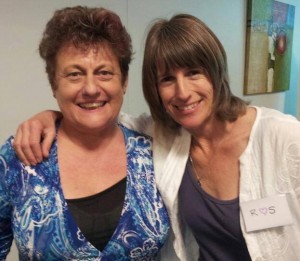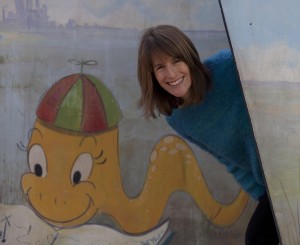At the 2015 Australian laughter conference, I was delighted to connect with Ros Ben-Moshe, a woman I’d spoken with numerous times about laughter yoga, written articles about and never met.
One of the country’s leading laughter wellness therapists, Ros is also an academic who has applied independent research rigour to laughter yoga to see what benefits it truly brings, particularly to older people.
Ros agreed to share some insights with readers of The Happydemic.
What was the most significant physical health benefit you found in your university research into laughter yoga and older people?
The Laugh Out Loud pilot, carried out in residential aged care settings in Victoria, measured blood pressure, heart rate (before and after each session) and psychological response (at 3 intervals) from 30 minutes of laughter, one time per week for 6 weeks. We also measured changes in overall wellbeing. I had read that regular laughter reduces blood pressure and was delighted that our study also demonstrated that, after an initial peak in blood pressure, it came right down, which is really important in reducing stress levels.
And you say there’s evidence to suggest laughter yoga exercises may keep dementia at bay: is that right?
As an aerobic exercise, laughter enhances oxygen supply to all cells of the body, which is particularly important for optimising brain function.
Laughter stimulates both hemispheres of the brain, similar to meditation. It has also been established that incorporating new activities can help our brain stay young. Laughter exercises are generally a new concept for people to learn; how to clap and chant (ho, ho, ha, ha), the different actions, vocal cues and so on. These exercises provide a great new challenge for the brain to learn which is especially beneficial in people with dementia. Activities encourage a range of different responses that have often become dormant. For example, I am constantly amazed at how people’s reflexes kick in when I throw my big laughter ball at them!
Older people with dementia may struggle with many other forms of communication, such as speech, but laughter is innate. As an inherently natural response, it comes back to people easily. I always find that there is so much more chatter and heightened levels of energy and alertness after a session.
I believe there is so much untapped potential and I can’t wait to conduct further investigations in this area.
You’ve dedicated years to bring joy into the lives of many, particularly older, Australians. Why the passion for older Australians particularly?
I love laughing with people of all ages, but I’ve always loved older people. I had a close bond with both my grandmothers and even ‘adopted’ a grandfather towards the end of his life. I find that older people have such a beautiful energy, with so much wisdom and life experience. I love watching how laughter brings that out – people who passively sit in their chair seemingly for hours, come to life. The stories begin and the dust that has often accumulated over the years masking people’s personalities miraculously lifts to reveal… the lady who used to be in the state basketball team, the lady who rode as a pillion passenger on a motorbike in a time long gone and the gentleman who clearly must have been a hit with the ladies as a semi-professional ballroom dancer.
Thanks for these insights Ros. One last question: how much laughter do you recommend for your older participants?
Incorporating 10-15 minutes of laughter a day is optimal, and seems to be the amount of time it takes to really feel laughter’s effect on mind, body and spirit, at any age. A 30-minute laugher workout once a week works well for older participants. The main thing is to not leave laughter to chance.
Ros Ben-Moshe is an adjunct lecturer at La Trobe University in Victoria and founder of LaughLife wellbeing programs.


Really enjoyed your comments, I have worked with dementia clients for over twenty years and have found laughter yoga a great connector for elderly, carers and families I use the sessions to bring all these groups into one fun connecting group. Everyone gains something on a equal plan, it’s very uplifting.
Thank you so much for sharing your experience Caroline.
Very interesting. Thanks for sharing. As my mother descends into dementia, I found this very helpful. Dolores
Thank you Dolores. It’s a hard road to see a loved one’s memory disappear. I’m inspired by the growing evidence that laughter can help trigger the past.
Comments are closed.